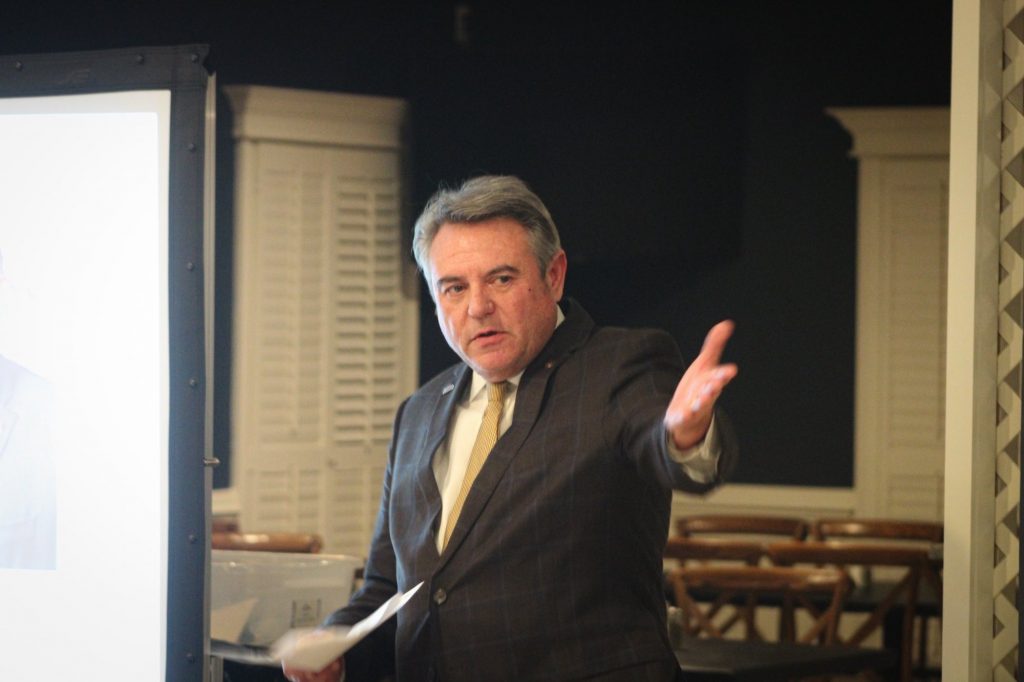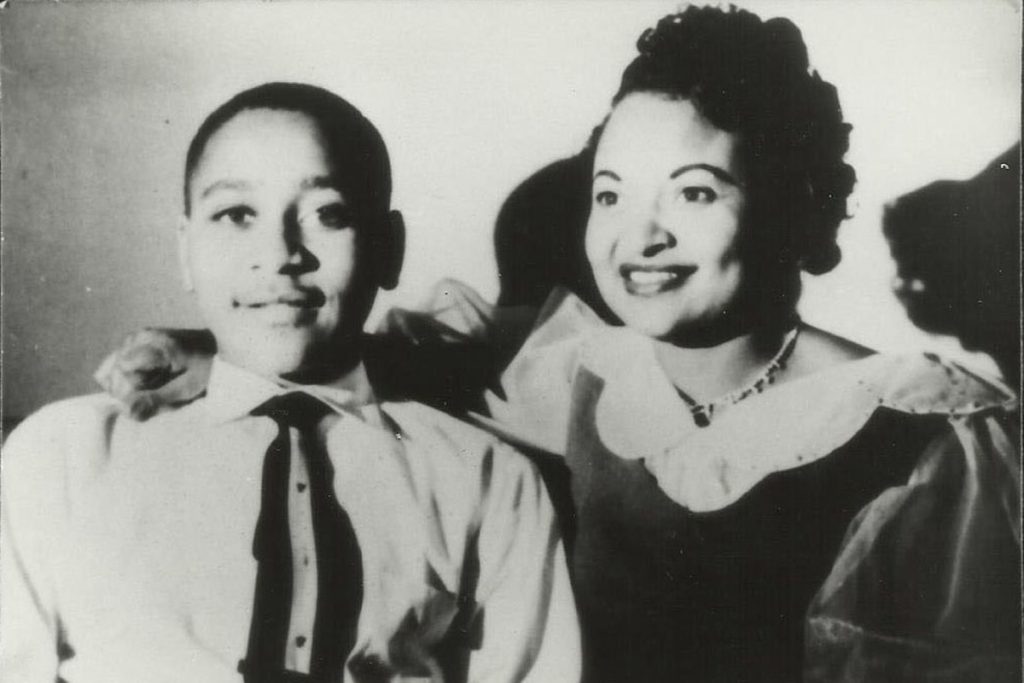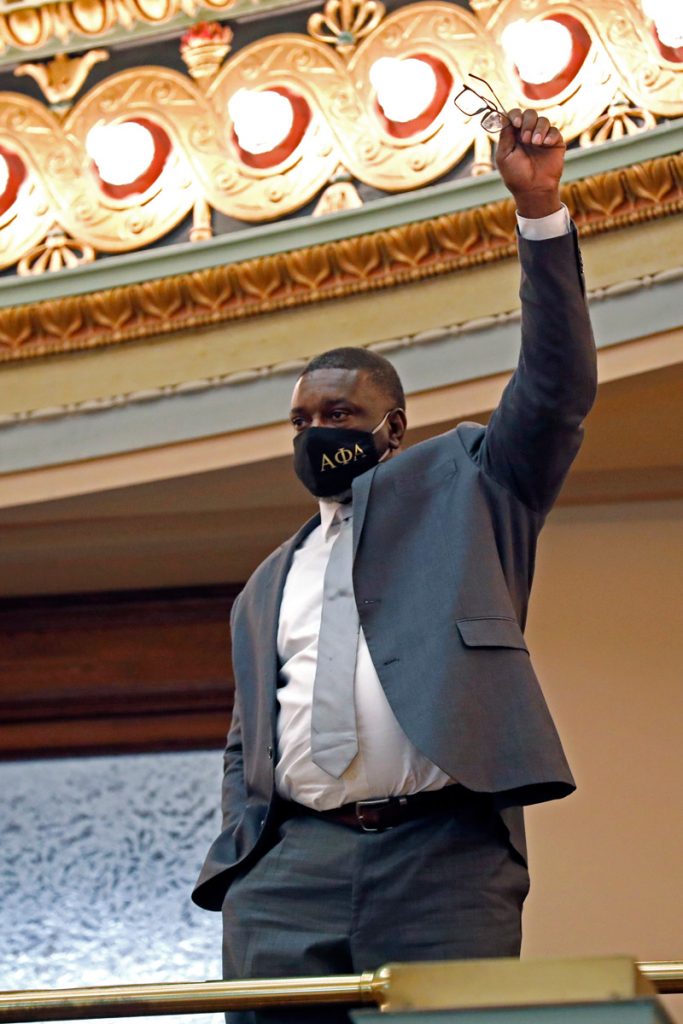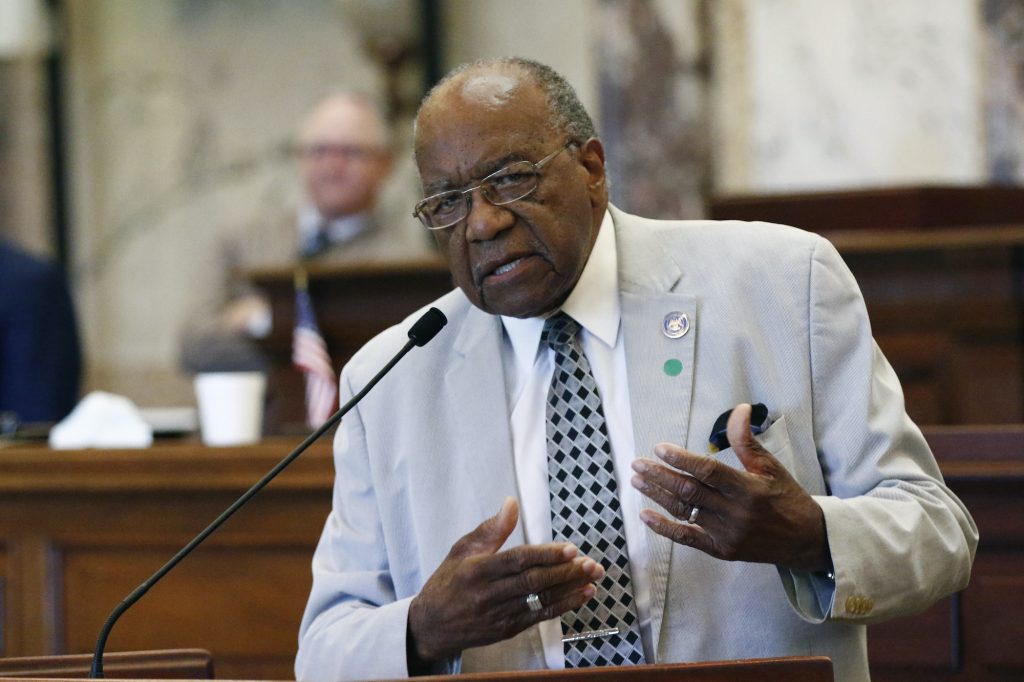Every Black member of the Mississippi Senate walked out today as their white colleagues voted to approve a bill that Republicans have described as legislation to prevent so-called “critical race theory” from being taught in schools. The bill’s short title is “Critical Race Theory; prohibit,” but the text of the bill neither mentions nor describes critical race theory.
The Encyclopedia Britannica defines critical race theory as an “intellectual movement and loosely organized framework of legal analysis based on the premise that race is not a natural, biologically grounded feature of physically distinct subgroups of human beings but a socially constructed (culturally invented) category that is used to oppress and exploit people of colour.” It appears in law-school curriculums or in advanced sociology courses in college.
The bill that white lawmakers approved today addresses none of those topics, however.
‘A Very Simple Bill’
“Senate Bill 2113 is a very simple bill,” the bill’s author, Sen. Michael McLendon, a white Hernando Republican, said today as he presented the bill on the Senate floor. “It prohibits school districts, universities and community colleges from requiring students to adhere to any tenet providing that one race, sex or ethnicity is inherently superior or inferior to another.”
But McLendon admitted that he found no evidence that “critical race theory” is taught in Mississippi’s public schools.
“So many people came to me concerned about what children could possibly be taught in Mississippi, so I contacted our school superintendent (about critical race theory) and he said, ‘No sir, not to my knowledge,’” McLendon said on the floor. “I contacted the Department of Education, (State Superintendent) Carey Wright, and she said, ‘No sir, not to my knowledge.’

“But I did have enough constituents that were concerned over this, over national news—and I know you can take national news with a grain of salt—but there were so many issues and concerns that people had about this.”
Sen. Sollie B. Norwood, a Black Democrat from Jackson, pointed out that lawmakers often “get several calls about several different issues.”
“For every issue we get calls about, we don’t see a reason to codify it into legislation. … I’ve talked to approximately 26 superintendents across the state, none of which voiced a concern about this,” Norwood said on the floor.
The text of the bill itself says that “no public institutions of higher learning, school district or public school, including public charter schools, shall direct or otherwise compel students to personally affirm, adopt or adhere to any of the following tenants (sic): (a) That any sex, race, ethnicity, religion or national origin is inherently superior or inferior; or (b) That individuals should be adversely treated on the basis of their sex, race, ethnicity, religion or national origin.”
The bill also says that such entities cannot “make a distinction or classification of students based on account of race” except for the required collection and reporting of demographic information; that no school may teach a “course of instruction or unit of study that directs or otherwise compels students to personally affirm, adopt or adhere to” the idea that any one sex, race, ethnicity, religion or national origin is inherently superior or inferior to another; and that funds can be witheld from educational institutions that violate the text of the act.’’
In other states nationwide, conservative activists have backed legislation more explicitly targeting educators who teach about racism, claiming that doing so can infringe upon the rights of white students or make them feel inferior. In Florida, Republican Gov. Ron DeSantis is backing a bill that would prohibit public schools and private businesses from making people feel “guilt” or “discomfort” because of their race. No such provisions are in the Mississippi Senate bill, however.
‘Mississippi Doesn’t Need This’
During debate on the Mississippi Senate floor, Sen. David Jordan, a Black Democrat from Greenwood, told McLendon that the bill was “not needed.”
“Mississippi doesn’t need this,” he said. “We need more cohesiveness. And the students are doing better than we are in this kind of cohesiveness. There is a lot of fear out there, I’ll agree, but it doesn’t have any basis unless you want to turn back to the old system, and I hope and pray that’s not the reason for this piece of legislation. There’s nobody after anybody.
“If anybody should be concerned about racism more, it ought to be those of us whose parents watered these lands with their tears and made it rich with their bones. Those are my ancestors. And yet we are willing and open-minded enough to try to work together with those who enslaved us to say here we are at a point where we can get together. … Wouldn’t you agree with me that it is not necessary?”

McLendon disagreed, saying the bill was not about “erasing history.”
“I believe it is necessary,” he told Jordan. “I believe we should not be teaching any child that they’re superior or inferior,” the white Republican lawmaker said.
“Nobody’s doing that,” Jordan replied. “It’s not being done. Nobody’s teaching inferiority.”
McLendon said the bill was not about “erasing history.”
But Jordan maintained that the bill would create unnecessary problems. Sen. Norwood also spoke on this floor, raising objections to lawmakers’ use of the term “critical race theory.”
“I’m quiet. I’m a mostly unassuming person. But we’re talking about something this morning that is very disturbing. I have a folder full of information relative to critical race theory,” he said, holding up a manila organizer. “And it all is very different. So what is critical race theory? It’s a moving target. We’re going to put our teachers in a position where they’re afraid to teach, and to teach the truth.”
Earlier this week, Norwood noted, Americans celebrated the Martin Luther King Jr. holiday.
“Dr. King said ‘shallow understanding from people of good will is more frustrating than absolute misunderstanding from people of ill will.’ Dr. King further said that ‘the ultimate tragedy is not the oppression and cruelty by the bad people, but the silence over that by the good people.’
Before the voting began, the chamber’s Black members stood up and marched out of the room together. Sen. Derrick Simmons, a Black Democrat from Greenville, told Mississippi Free Press reporter Nick Judin this afternoon that they “became more and more frustrated during the debate.”
“We respect our colleagues; we understand we have different viewpoints and different opinions, but once we heard the passionate cry from Senator David Jordan and Senator Sollie Norwood, it became even more obvious that our votes are a waste of time on a bill that is a solution searching for a problem,” he said. “… I don’t know what the real target is, but I’m afraid it will have a chilling effect on academic freedom. It serves as a censorship bill.
“I asked Senator McLendon about the story of Mamie Till. Would that still be taught in Mississippi? The senator said yes. But I don’t know if some other teacher somewhere else in Mississippi is going to view it that way.”
The only white Democrats in the Mississippi Senate, Sens. David Blount of Jackson and Hob Bryan of Amory, were also the only Democrats who remained in the chamber for the vote. The bill passed 32-to-2, with all yes votes coming from Republican members. Four Republicans did not vote.
‘The Disunited State of Mississippi’
Discussions about how race should be taught in schools have been a constant thread in recent years, and racism censorship efforts have a long, dark history in Mississippi.
In late 2020, former President Donald Trump appointed ex-Mississippi Gov. Phil Bryant to his 1776 Commission to draft a plan for a national system of “patriotic education.” The proposal included a whitewashed version of American history that called for omitting uncomfortable and disturbing parts of the nation’s racist past. When he took office, though, President Joe Biden disposed of the report. Last year, the Mississippi Legislature declined current-Gov. Tate Reeves’ request to create his own state version of a “patriotic education.”

Earlier this month, Mississippi State Auditor Shad White targeted an anti-racist Mississippi library book program for adults and children that he described as a “cancer on our society,” implying that they teach “racism” against white people. He singled out one children’s book, “Not My Idea.” The book’s white author, Anastasia Higginbotham, defended it against White’s criticism in a column she sent to the Mississippi Free Press.
“When you’re born white, racial justice education and practices are a salvation and a way to love yourself—and that is what ‘Not My Idea’ is about,” she wrote. “It offers a path into another legacy of bold and care-full action—one we haven’t taught kids nearly enough about—in which people of all colors who love each other and love justice have always come together within Black-led movements to resist racism and plant justice instead.”
Higginbotham is appearing on MFP Live Thursday, Jan. 27, at 6 p.m. to talk about her book and what she means by “whiteness.”
Today’s bill does not mention books nor prohibit any specific race-related materials. Mississippi Sen. Juan Barnett, D-Heidelberg, told the Mississippi Free Press this afternoon that Republican leaders have “never” given “an explanation that warranted why we need this bill.”
“There was nothing from the Department of Education that this was in any school,” he said, referring to the fact that Mississippi State Superintendent Carey M. Wright said last year that critical race theory is not taught in any Mississippi schools. “This was a knee-jerk reaction.
“When we took down the (Confederate-themed) flag in Mississippi, it was a message that we understood that we need to be one Mississippi—that for too long we have tolerated the things that divide us. And when we took down that flag and raised the new one, to me, that was the dawn of a new day. But today set us back. When the flag came down, I said that as a U.S. veteran, I’m feeling so good and so proud to live in the United States of America. Today reminded me again that I still live in the disunited State of Mississippi.”
‘Politicians Getting Involved Is Not A Good Thing’
The Daily Beast reported late last year that wealthy right-wing groups are behind the national “anti-CRT” movement. An assortment of PACs and other organizations funded efforts last year to elect opponents of critical race theory to school boards across the country.
Though this is the only bill that has reached the floor in either Mississippi chamber, lawmakers have introduced several bills this session that purport to target the teaching of “critical race theory,” if only in name. Parents Campaign President Nancy Loome, whose organization lobbies on behalf of public-school educators, told Mississippi Free Press reporter Ashton Pittman this month that her group opposes such efforts.
Black members of Mississippi's senate walk out of the chamber before the final vote on a bill to ban teaching critical race theory in schools and universities. The vote passed. pic.twitter.com/hLUwAn6ekL
— Kobee Vance (@kobeevance) January 21, 2022
“Our position has always been that the Legislature should not mandate how and what the teachers teach,” she said. “That is for the professionals at the Department of Education and we have always held that position. We just don’t believe that politicians should be in the business of dictating curriculum. If local parents have concerns, those are local issues they can take up on the local level with their local folks.
“But again, it is just not something that politicians need to be involved in for very obvious reasons. They just don’t have a full enough understanding of curriculum and politicians getting involved is just not a good thing.”
The bill the Senate approved today still must earn approval in the Mississippi House of Representatives and Gov. Tate Reeves’ signature in order to become law. Both House Speaker Philip Gunn and Reeves expressed support for a so-called “critical race theory” law last year.








